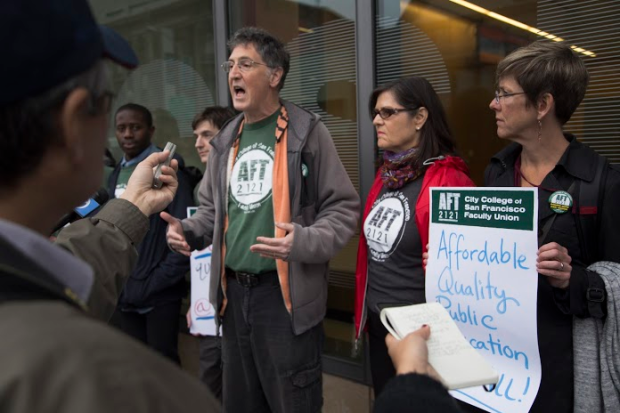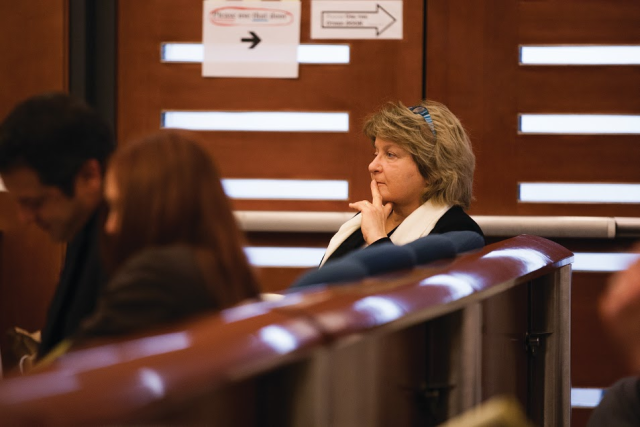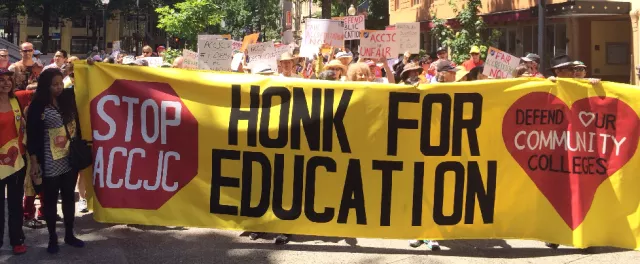City College and its faculty have come to terms on a new contract – and now the union is focusing on another long-term challenge: Getting rid of the rogue accrediting agency that created the financial problems at City.
The California Federation of Teachers filed a detailed complaint Aug. 8 with the US Department of Education demanding, among other things, that the Accrediting Commission for Community and Junior Colleges be immediately stripped of its authority and replaced.

The complaint argues that the ACCJC should not be allowed to decide this winter whether City College remains accredited. “The ACCJC continues to flaunt federal rules and its authority should be rescinded immediately,” the complaint states.
Pretty much everyone in the educational world has lost faith in the ACCJC, including the state chancellor and state Community College Board (hardly, by the way, a radical group). The colleges that pay for the ACCJC and use its services no longer trust it.
But still, like Dracula, the agency refuses to die. In fact, it’s representatives are scheduled to be on campus in October to review whether City College has jumped through all of the hoops and done all of the things the agency wants, some of which are just bad and wrong.
And then early in 2017, it’s supposed to render a final verdict on accreditation – from which there will be no appeal.
So the people who a Superior Court judge, the state regulators, and their own constituents say are biased and unqualified still hold the school’s fate in their hands.

The CFT, with the support of the American Federation of Teachers, wants to halt that process and give another organization – one with more credibility – the right to review City College.
It’s hard to underestimate the damage that the ACJC has done to City College and to the San Francisco community. The threats to shut the place down have devastated enrollment, hurt tens of thousands of students, and cost the state taxpayers millions of dollars.
There’s no way to hold the agency, or its astonishingly arrogant leader, Barbara Beno, directly accountable for the wreckage. The ACCJC is funded by the schools that subscribe to its service, so even if City College were able to sue for damages, there wouldn’t be any money.
But at the very least, the Department of Education could stop and further harm by in essence doing what the ACCJC tried to do to City College: Revoking the agency’s accreditation.
“ACCJC’s institutional failures are such that they cannot be corrected,” the complaint states.
Among the criteria for federal recognition of a college accreditor: The agency has to be “widely accepted” by educators and educational institutions. That makes sense: An accrediting agency has to has credibility.
But by any standard at all, the ACCJC lacks that credibility. In the past 15 years, the ACCJC has sanctioned schools at 400 times the rate of the next strictest accrediting body in the country. At times, the complaint notes, that rate has exceeded 700 percent.
(In the meantime, the ACCJC had no problem accrediting a for-profit chain of schools that the feds had to close for misleading students.)
The chief executive officers of the 113 California community colleges have agreed that the ACCJC is not acceptable and are looking for alternatives.
So why is this operation still going? (My suggestion, that the schools just quit paying their ACCJC dues, which would effectively kill the agency, may not be practical, but something has to be done.)
So it’s now in the hands of the Department of Education, in the waning days of the Obama Administration. Obama’s DOE has been highly critical of the ACCJC,, and it’s crazy to think that City College could still be trying to please an out-of-control accreditor that has done its best to ruin one of the top community colleges in the state.
The DOE tends to move slowly. But there’s not a lot of time left. “We are asking for an immediate decision, for immediate de-listing,” Tim Killikelly, president of Local 2121 and a named complainant, told me.
Unless that happens quickly, the visiting team will arrive a City College in October. In the past, those teams have been a lot more supportive of City; the bad decisions were not made, court testimony showed, by the actual academics who evaluated the school but by the commission itself.
The DOE has known for more than three years that this is a problem. There’s no evidence to the contrary. It’s just bureaucratic slowness – and City College’s future is in the balance.







